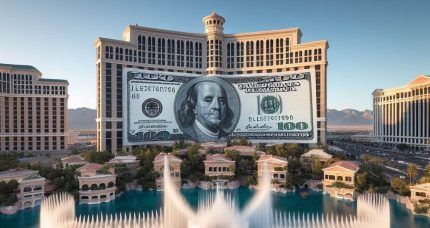Resort Fees Hiked to $50 a Night at Some MGM Las Vegas Properties

Posted on: January 18, 2024, 11:46h.
Last updated on: January 18, 2024, 12:29h.
Resort fees have been raised approximately $3 per night at all MGM Las Vegas hotels. This means they have now hit $50 per night at the company’s most expensive tier: Bellagio, Aria, Vdara, and Cosmopolitan.

Resort fees are now up to $45 per night at MGM Grand, Mandalay Bay, and the Delano, $42 per night at New York-New York, NoMad, Park MGM, and The Signature at MGM Grand, and $37 per night at Excalibur and Luxor.
The new fees went into effect on January 16.
On a positive note, most Las Vegas hotels now disclose resort fees on their websites, so they’re neither hidden nor surprising. Resort fees are now presented to guests when they shop for hotel rooms, whereas previously, some hotels and chains didn’t disclose their fees until checkout.
In the MGM world, selecting a date range now produces a list of average room rates and resort fees at each of their nine Las Vegas properties.
The added transparency may not represent kind-heartedness, but instead, serve as a defense against a proposed Federal Trade Commission (FTC) rule that would prohibit “hidden and bogus” junk fees in the hospitality and live entertainment industries.
If resort fees aren’t hidden, they’re exempt from the rule. That rule, proposed by the Biden administration in November, is still undergoing public comment, with no date set for a vote.
Why Resort Fees Exist
According to the resorts, they’re a convenience for their guests who demand only one price for a bundle of amenities rather than be billed separately for things like Wi-Fi, gym access, digital newspaper and magazine downloads, boarding pass printing, and local phone calls.
Because all travelers use the hotel phone to make local calls in 2024.
No. The real reason resort fees exist is the introduction of online travel agencies (OTAs) in 1996. The first resort fees were rolled out one year later, allowing hotels to compete on Expedia, Travelocity, and Booking.com.
That’s because OTA users almost always search for the “best value” or “lowest price” parameters on these platforms, and the only way for resorts to show up higher in these searches is to offer lower daily room rates, which would cut into their profits.
So instead, they categorize a portion of their rates as separate fees.
Now that 41% of all booking comes through OTAs versus 29% via hotel websites and 29% through travel agents, according to hospitality.net, the cost of not appearing on the first page of OTA results has increased, too.
Resort fees provide other economic benefits as well. Hotels pay commissions to OTAs for every room booked — commissions based only on room rates, not separate fees. Additionally, resort fees contribute to revenue per available room, an important performance indicator. And according to the analyst firm OTA Insight, resort fees offer tax advantages.
Source: casino.org
